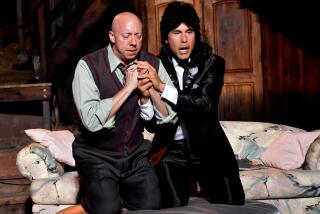Sam Gold works to revive ‘Picnic’ — and William Inge’s standing
This story has been corrected. See note below.
NEW YORK — Sixty years ago next month, playwright William Inge’s “Picnic” opened on Broadway, establishing the Kansas-born playwright as one of the theater’s brightest lights, considered the equal of Tennessee Williams and Arthur Miller.
The play, in which a sexy young drifter causes havoc in the lives of the women of a small Midwestern town, won the Pulitzer Prize as well as the New York Drama Critics Circle award that year. Two years later, “Picnic” became a successful Oscar-winning film starring Kim Novak and William Holden.
FOR THE RECORD:
“Picnic”: An article about the Broadway revival of “Picnic” in the Jan. 12 Calendar section referred to the Annie Baker play “Circle Mirror Transformation” as “Mirror Circle Transformation.” In addition, the article referred to a character in “Picnic,” the boyfriend of Rosemary Sydney, as Ralph. The character’s name is Howard.
Inge felt he had to do something about all that success, so he rewrote the play.
2012 IN REVIEW: L.A.’s top 10 arts and culture stories
“Inge was very unhappy with the original production,” says director Sam Gold of the 1953 production. “He was trying to write about the kind of failures and minor tragedies of these women, and Josh Logan [the director] argued for a more romantic and hopeful plotline. And I think that because Inge never got to have the production he wanted, that may have affected its place in history.”
No one compares Inge to Williams or Miller now, and Gold is trying to do something about that. In a new Roundabout Theatre revival of “Picnic,” which opens Sunday on Broadway, the 34-year-old director is honoring the darker intentions that spurred Inge to rewrite the play. (Called “Summer Brave,” it eventually was produced on Broadway in 1975 and promptly flopped.) In the process, he could rescue “Picnic” and the playwright from the shadows.
“There is nothing more exciting than discovering a new voice,” says Todd Haimes, the Roundabout’s artistic director. “But next to that is to rediscover a work that has been relegated to the second-rate bin.”
The way to do that, he added, is with a director who has a passion for the piece. “They do their best work when it’s something that they’ve been dying to do and have been thinking about for years,” he said. “That’s really the genesis of this. Sam came to us.”
Gold, who has directed acclaimed productions of Annie Baker’s “Circle Mirror Transformation” and Theresa Rebeck’s “Seminar,” came across Inge’s oeuvre while doing research for his controversial Roundabout revival of John Osborne’s 1956 classic, “Look Back in Anger,” last year.
What he discovered was that after four consecutive Broadway hits, including “Come Back, Little Sheba,” “Picnic,” Bus Stop” and “The Dark at the Top of the Stairs” — all of which were made into popular films — Inge’s career went into a tailspin. It was slowed only briefly when he won an Oscar in 1962 for the screenplay of “Splendor in the Grass,” directed by Elia Kazan and starring Warren Beatty and Natalie Wood.
PHOTOS: Arts and Culture by The Times
Despondent, given to serious bouts of depression and alcoholism and unable to cope with his homosexuality, the playwright committed suicide in 1973 at age 60.
“I didn’t know much about him but I became very excited by the work and fascinated by his life,” Gold says. “I couldn’t believe how great and beautiful these plays were and how few chances New York audiences had to see them. They had so much more richness and depth than I had expected and I loved the idea of mining the details of this ‘small story’ with these incredibly complex and very human characters.”
As in the plays of Horton Foote and Anton Chekhov, very little happens in “Picnic.” It is centered on two adjoining households. One is the home of Flo Owens, an abandoned wife with two daughters, the tomboy Millie and her beautiful teenage sister, Madge. Their next-door neighbor is Helen Potts, a spinster saddled with an ailing and querulous mother.
Their sexually repressed worlds are upended when Mrs. Potts hires Hal Carter to do some chores around the house. His muscular body, seen bare-chested, sends out erotic waves that swamp not only Madge — who is intended for the town’s rich kid — but also Rosemary Sydney, a middle-age boarder of Mrs. Owens’. The pheromones pinging around the back porches incite schoolteacher Rosemary into a desperate scene with her longtime boyfriend, a whiskey-nipping businessman set in his ways.
That scene, in which Rosemary, played by Elizabeth Marvel, begs boyfriend Howard (Reed Birney) to marry her, crumpling down on her knees in abject humiliation, is the lodestar of this production.
“I started from there,” says the director. “There is a way of looking at this play through the eyes of the young people. But I was guided by Inge’s initial impulse to explore the lives of the older generation, the mistakes they made, their failures, their tragedies. At a certain point, you see that your life is not what you fantasized it to be, it’s something else, and you have to live with that difference.”
Gold believes that the prosaic nature of Inge’s work — the quiet terrors of his characters — has caused his legacy to suffer.
“They’re not as poetic and grand as Williams’ nor are they as symbolic and large as some of the characters in Miller’s plays, so they’re harder to make a case for in a larger scale,” says the director.
He says he was guided by a comparison Kazan once made between Williams and Inge. While Williams’ plays are filled with “delusions and fantasies and lies,” Kazan wrote, the people in Inge’s plays are “always grounded in reality, that great enemy.”
In Case You Missed It: OSCARS 2013 | Complete list | Snubs & surprises | Reactions | Play-at-Home ballot |Trivia | Oscar Watch | Timeline| Full coverage
Because Inge is so subtle, the plays can be difficult to act and direct, says Peter Ellenstein, the artistic director of the William Inge Center for the Arts in Independence, Kan., the hometown of the playwright and the site of the annual William Inge Festival, which honors the work of a living American writer.
“If the plays are not done well, it’s easy for them to seem hackneyed and dull,” says Ellenstein. “But it’s fantastic to have such a high-profile production with such a high-profile director.” Ellenstein added that whatever the critics may say about the production, the Roundabout’s decision to revive the play “demonstrates that really fine theater artists are attracted to Inge because of the profundity of the writing. He doesn’t feel compelled to tie everything up in tidy little endings.”
Other playwrights have gone through a period in which their work has been considered passé. Director Bartlett Sher has recently resuscitated the flagging reputation of Clifford Odets with his critically hailed Lincoln Center Theater productions of “Awake and Sing!” (2006’s best revival Tony winner) and, this season, “Golden Boy,” certain to figure prominently at the Tonys this year.
Like Gold, actress Ellen Burstyn, who plays Mrs. Potts, finds it impossible to separate the playwright from the play — to her, “Picnic” is autobiographical.
“Inge never owned his life, could never face the fact that he was homosexual, he was still tied to his mother, and Mrs. Potts represents that aspect,” says the actress. “I think Inge truly loved all his characters, understood them, felt for them, forgave them their foibles and flaws.... He did for them what he could not do for himself. He allowed them to be themselves.”
For the record, Jan. 16: An earlier version of this story incorrectly stated the name of playwright Annie Baker’s “Circle Mirror Transformation” as “Mirror Circle Transformation.” It also gave the wrong name for the character of Rosemary’s boyfriend. It is Howard, not Ralph.
MORE
INTERACTIVE: Christopher Hawthorne’s On the Boulevards
VOTE: What’s the best version of ‘O Holy Night’?
PHOTOS: Arts and culture in pictures
More to Read
The biggest entertainment stories
Get our big stories about Hollywood, film, television, music, arts, culture and more right in your inbox as soon as they publish.
You may occasionally receive promotional content from the Los Angeles Times.










